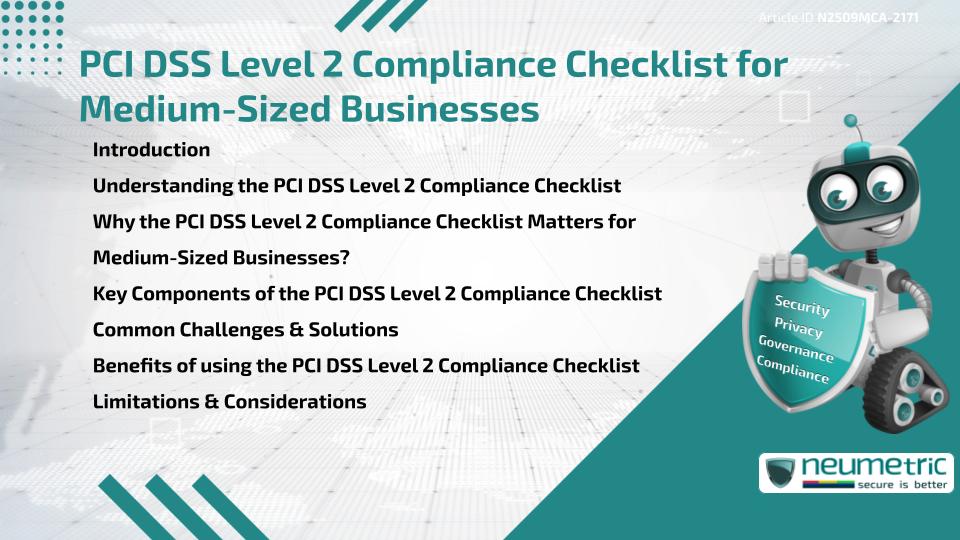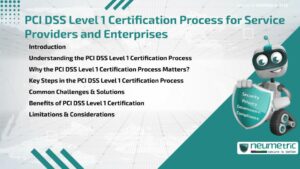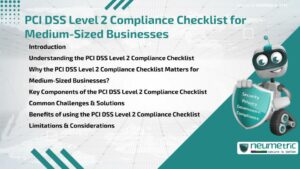Table of Contents
ToggleIntroduction
The PCI DSS Level 2 Compliance Checklist is an essential Tool for Medium-sized Businesses that process a moderate Volume of Payment Card Transactions. Compliance with the Payment Card Industry Data Security Standard [PCI DSS] is Critical for protecting Cardholder Data, avoiding penalties & building Customer Trust. This article explains what the Checklist includes, Why it matters & How it benefits Businesses striving for secure Digital Operations.
Understanding the PCI DSS Level 2 Compliance Checklist
PCI DSS Compliance is divided into Levels based on Transaction Volume. Level 2 applies to Businesses processing between one (1) Million & six (6) Million Transactions annually. The PCI DSS Level 2 Compliance Checklist provides structured steps to help these Businesses meet Security requirements through Self-assessment Questionnaires [SAQs] and validation Procedures.
For official details, see the PCI Security Standards Council.
Why the PCI DSS Level 2 Compliance Checklist Matters for Medium-sized Businesses?
Medium-sized Businesses often lack the extensive Resources of large Enterprises but face similar Cyber Risks. The PCI DSS Level 2 Compliance Checklist matters because it:
- Simplifies Compliance with Industry Security Standards.
- Reduces the Risk of costly Data Breaches.
- Helps avoid Penalties from Card Networks.
- Builds trust with Customers, Partners & Banks.
The NCSC UK Payment security guidance also stresses the importance of structured Compliance for organisations of this size.
Key Components of the PCI DSS Level 2 Compliance Checklist
- Network Security – Install & Maintain Firewalls to protect Cardholder Data.
- Data Protection – Encrypt Sensitive Information during Storage & Transmission.
- Access Controls – Restrict Data access to Authorised Personnel only.
- Vulnerability Management – Regularly update Systems & Perform Patch Management.
- Monitoring & Logging – Track access to Cardholder Data through Continuous Monitoring.
- Testing Security Systems – Perform Penetration Testing & Vulnerability Scans.
- Policy & Awareness – Establish Security Policies & Train Staff.
- Self-Assessment Questionnaire [SAQ] – Complete required SAQ forms to validate Compliance.
The ISACA Compliance tools provide further resources for managing these requirements.
Common Challenges & Solutions
- Limited Resources – Use managed Compliance services to reduce the internal burden.
- Complex SAQs – Engage a Qualified Security Assessor [QSA] for guidance when needed.
- Evolving Standards – Stay updated with changes such as PCI DSS v4.0.
- Third Party Risks – Ensure vendors handling Payment Data also meet PCI DSS requirements.
For additional support, see ENISA Payment security guidance.
Benefits of using the PCI DSS Level 2 Compliance Checklist
- Regulatory Assurance – Helps avoid Penalties & Fines.
- Stronger Security Posture – Protects against Fraud & Breaches.
- Operational Clarity – Provides a structured approach to Compliance.
- Customer Confidence – Demonstrates commitment to Payment Security.
Limitations & Considerations
The PCI DSS Level 2 Compliance Checklist provides guidance but does not guarantee Security. Businesses must tailor implementation to their Systems, Processes & Risks. Ongoing Monitoring & Employee Training are vital to sustaining Compliance.
Takeaways
- The PCI DSS Level 2 Compliance Checklist is designed for Medium-sized Businesses processing one (1) to six (6) million Transactions annually.
- It covers Network Security, Encryption, Access Control, Vulnerability Management & Monitoring.
- Using the Checklist enhances Compliance, reduces Risks & Builds Customer Trust.
FAQ
What is the PCI DSS Level 2 Compliance Checklist?
It is a structured guide to help Medium-sized Businesses meet PCI DSS requirements.
Who does PCI DSS Level 2 apply to?
Businesses processing between one (1) and six (6) Million Card Transactions annually.
What is included in the Checklist?
Network Security, Data Protection, Access Control, Vulnerability Management & SAQ validation.
Do Level 2 Businesses need a QSA?
Not always, but engaging a QSA can simplify complex Assessments.
Does Compliance guarantee Security?
No, but it provides a strong Foundation for protecting Cardholder Data.
References
- PCI Security Standards Council
- NCSC UK – Payment Security Guidance
- ISACA – Compliance Tools
- ENISA – Payment Security Guidance
- IT Governance – PCI DSS Resources
Need help for Security, Privacy, Governance & VAPT?
Neumetric provides organisations the necessary help to achieve their Cybersecurity, Compliance, Governance, Privacy, Certifications & Pentesting needs.
Organisations & Businesses, specifically those which provide SaaS & AI Solutions in the Fintech, BFSI & other regulated sectors, usually need a Cybersecurity Partner for meeting & maintaining the ongoing Security & Privacy needs & requirements of their Enterprise Clients & Privacy conscious Customers.
SOC 2, ISO 27001, ISO 42001, NIST, HIPAA, HECVAT, EU GDPR are some of the Frameworks that are served by Fusion – a SaaS, multimodular, multitenant, centralised, automated, Cybersecurity & Compliance Management system.
Neumetric also provides Expert Services for technical security which covers VAPT for Web Applications, APIs, iOS & Android Mobile Apps, Security Testing for AWS & other Cloud Environments & Cloud Infrastructure & other similar scopes.
Reach out to us by Email or filling out the Contact Form…





